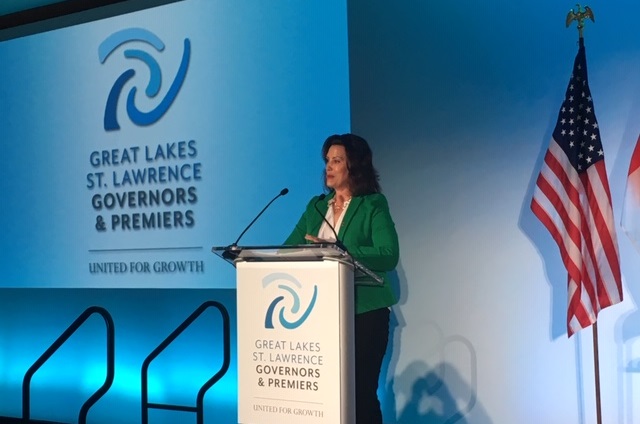
Michigan Gov. Gretchen Whitmer said last week that she will continue the leadership tradition of her predecessors when it comes to the Great Lakes.
“Absolutely, Michigan has to lead on Great Lakes issues,” she said in an interview with Great Lakes Now.
Whitmer spoke with Great Lakes Now during a break at a meeting of Great Lakes governors and Canadian premiers in Milwaukee. It was the first gathering of her regional counterparts since she took office in January.
In a media briefing prior to the conference, with Lake Michigan as the backdrop, Whitmer said “the Great Lakes are at the core of who Michigan is.”
During the conference, Whitmer said the region has 25 percent of the electoral votes and an opportunity to get presidential candidates to subscribe to a Great Lakes agenda.
“I’m going to lead the charge on that,” she said.
On the status of stalled negotiations with Enbridge Inc. on the Line 5 Straits of Mackinac pipeline, Whitmer said she “found out through the media that I was getting sued by Enbridge” and is “mindful” of the risks of litigation.
Here’s the full interview. The interview was recorded, transcribed and edited for clarity by senior correspondent, Gary Wilson.
Great Lakes Now (GLN): On the Enbridge Line 5 pipeline, you campaigned for governor saying you wanted to get the oil out of the water.
Negotiations with Enbridge on modifying the pipeline-in-a-tunnel contract have stalled and legal complications are looming. Are you prepared for a protracted legal battle on Line 5 and the possibility that you could get an unfavorable legal decision that would hamper your ability to negotiate?
Gov. Whitmer (GW): I’ve been mindful of the fact that the worst thing for Michigan is that pipeline staying in the water for a longer period of time and protracted litigation and exposing ourselves to risk with an unknown, without making progress in terms of a tunnel or another alternative. I think that is the worst-case scenario.
That’s why I sat down with Enbridge and tried to negotiate with them and tried to have a date certain where that pipeline would come out of the water. That was not acceptable to them, so I found out through the media that I was getting sued by Enbridge.
Unfortunately at this point it looks as though they are prepared for litigation, as is the (Michigan) attorney general. They’re going to litigate the efficacy of the contract around the tunnel. In the meantime, there still is an easement and there’s a question about whether that easement is still valid, and we’ll probably see the attorney general take some action on that front as well.
That’s what I was trying to avoid by talking to Enbridge but unfortunately, this is where we are at the moment. My goal is still, as it always has been, to take whatever action gets the oil out of the water at the quickest known time.
GLN: Two of your core constituencies are unions and environmental groups, and they have opposing positions on Line 5. Unions favor the construction of the pipeline in a tunnel, and they’ve written to you about that. Environmental groups have been strident on this issue since 2013 on wanting to have the pipeline shutdown.
One of them will lose. How will you reconcile your decisions with the losing side?
GW: What I believe unites everyone is that we want to protect the Great Lakes. There are differing views of what that means.
I know my friends in labor would love to construct a tunnel. They believe that is a good thing for our long-term energy supply and it puts a lot of people to work. My friends in the environmental community want to get the oil out of the water at the quickest moment. I think that when we stay focused on what unites us, and that is protecting the Great Lakes, then we can still continue to have a conversation even if it means that someone isn’t particularly pleased with the outcome of the question.
Protecting the Great Lakes, we have an incredible resource here which means we also have an incredible responsibility that comes along with it. I believe that it’s really important that while we try to build bridges literally and figuratively, we are solid in our protection of the Great Lakes, and it means getting that pipeline out of the water.
GLN: On regional leadership, Michigan governors traditionally have played a strong role on the Great Lakes even when they weren’t in the officially designated leadership positions. Other states still look to Michigan for guidance.
Is that a role you want to take on as governor, being either an official or de facto leader on the issues?
GW: Absolutely, Michigan has to lead on Great Lakes issues.
We have to build coalitions, and that’s something that I think is an inherent strength of the Great Lakes being in a region that has 25 percent of the Electoral College votes. In my remarks (during the conference) earlier I highlighted that we have an opportunity to drive a Great Lakes agenda and get presidential candidates, no matter which party, to subscribe to our agenda. That’s an inherent strength and something that I take very seriously, and that’s why I’m going to lead the charge on that.
GLN: In your comments at the opening day of the conference, you read a letter you received from a seventh-grader. You thought it was important to share that letter with your colleagues and with the broader Great Lakes community. Can you describe the essence of the letter and why it struck you?
GW: This is a seventh-grader who is prevailing on me to be a leader and protect our Great Lakes. The fact is that we have seventh-graders who are worried about things like roads and school supplies and drinking water and our Great Lakes. That’s something that I never worried about as a seventh-grader growing up in Michigan.
I think it shows how serious these issues are that our kids are even worried about it. They’re prevailing on us to stand up and do the right thing, and they don’t care about our partisan politics. They don’t care about who our stakeholders have always been. They don’t care about any of those issues. They just know that our water is important, it’s unique and it’s absolutely essential that we protect it.
1 Comment
-
Then get line 5 out if the water. The BP oil spill decimated the Gulf of Mexico and we are still recovering today.




